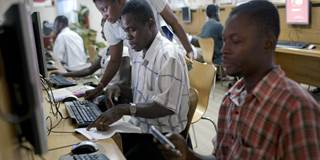By the end of the next decade, growth, productivity gains, and human development will be determined by levels of integration into the digital economy. To guard against new forms of inequality, the international community must do more to help developing countries close the connectivity gap.
GENEVA – It is easy to assume that access to the digital economy is ubiquitous, and that online shopping is the natural evolution of commerce. For example, in July, Amazon sold more than 100 million products to consumers worldwide during its annual Prime Day event, a $4.2 billion bonanza that included sales of table salt in India, Coke Zero in Singapore, and toothbrushes in China.
But figures like these mask the fact that for many people in developing countries, the road to e-commerce is riddled with potholes. Simply put, the growth of e-commerce is not automatic, and the spread of its benefits is not guaranteed.
Some of the obstacles are logistical. On the tiny South Pacific island of Tuvalu, for example, fewer than ten streets in the capital, Funafuti, are named, and only about 100 homes have a postal address. Even if everyone in Tuvalu had access to the Internet (which they don’t; only 13% of the country’s population had broadband in 2016, according to the World Bank), delivery of goods purchased online would be difficult.

GENEVA – It is easy to assume that access to the digital economy is ubiquitous, and that online shopping is the natural evolution of commerce. For example, in July, Amazon sold more than 100 million products to consumers worldwide during its annual Prime Day event, a $4.2 billion bonanza that included sales of table salt in India, Coke Zero in Singapore, and toothbrushes in China.
But figures like these mask the fact that for many people in developing countries, the road to e-commerce is riddled with potholes. Simply put, the growth of e-commerce is not automatic, and the spread of its benefits is not guaranteed.
Some of the obstacles are logistical. On the tiny South Pacific island of Tuvalu, for example, fewer than ten streets in the capital, Funafuti, are named, and only about 100 homes have a postal address. Even if everyone in Tuvalu had access to the Internet (which they don’t; only 13% of the country’s population had broadband in 2016, according to the World Bank), delivery of goods purchased online would be difficult.